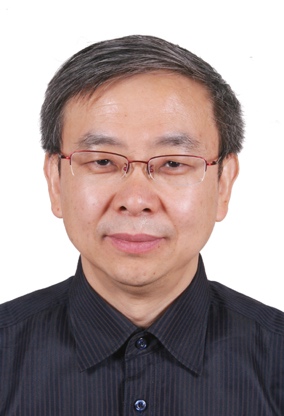
Prof. Jun LI
Theoretical Chemistry Center, Department of Chemistry, Tsinghua University, Beijing 100084, China
Tel: +86(10)62795381
E-Mail: junli@tsinghua.edu.cn
Website of research group: http://www.junlilab.org/index.html
Prof. Dr. Li received a Ph.D. in Physical Chemistry from Fujian Institute of Research on the Structure of Matter, Chinese Academy of Sciences (1992). He was a postdoctoral researcher at the Department of Chemistry, University of Siegen (Germany) and at the Department of Chemistry, The Ohio State University (USA) from 1994 to 1997. He worked as a Research Scientist at The Ohio State University from 1997 to 2001 and then became a staff member at the Pacific Northwest National Laboratory (PNNL, USA) in 2001, where he was appointed as a Senior Research Scientist and later promoted to a Chief Scientist. He was also an affiliated full professor at University of Idaho and Washington State University. He is now a Cheung Kong Professor at the Department of Chemistry, Tsinghua University. He is an elected AAAS Fellow (USA) and Chinese Chemical Society Fellow. His research involves computational chemistry, theoretical inorganic chemistry, heavy-element chemistry, and computational catalysis science. He has published six book chapters and more than 400 peer-reviewed papers with 30000+ citations.
Research Interests:
Quantum Inorganic Chemistry, Theoretical Actinide Chemistry, Computational Catalysis, Cluster Science, Computational Chemistry
Experience:
2005-present ChangJiang Professor, Department of Chemistry, Tsinghua University (China)
2010-2013 Adjunct Full Professor of Chemistry, Washington State University (USA)
2007-2010 Affiliate Full Professor of Chemistry, University of Idaho (USA)
2005-2009 Chief Scientist, Environmental Molecular Sciences Laboratory, PNNL
2004-2005 Senior Research Scientist II, Environmental Molecular Sciences Laboratory, PNNL
2001-2003 Senior Research Scientist I, Environmental Molecular Sciences Laboratory, PNNL
1997-2001 Research Scientist, The Ohio State University
1995-1997 Postdoctoral Researcher, The Ohio State University
1994-1995 Postdoctoral Fellow, University of Siegen (Germany)
1993-1994 Associate Professor, Fujian Institute, Chinese Academy of Sciences
1992-1993 Assistant Professor, Fujian Institute, Chinese Academy of Sciences
Education:
Ph.D (1992): Fujian Institute of Research on the Structure of Matter, Chinese Academy of Sciences
M.Sc. (1988): Hebei Normal University
Bachelor (1982): Shaanxi University of Technology
Selected Publications:
1. Y.-L. Wang, H.-S. Hu, W.-L. Li, F. Wei, J. Li, Relativistic Effects Break Periodicity in Group-6 Diatomic Molecules, J. Am. Chem. Soc. 2016, 138(4), 1126-1129.
2. P. Cui, H.-S. Hu, B. Zhao, J. T. Miller, P. Cheng, J. Li, A Multicentre-Bonded [ZnI]8 Cluster with Cubic Aromaticity, Nature Commun. 2015, 6, 6331.
3. H.-J. Zhai, Y.-F. Zhao, W.-L. Li, Q. Chen, H. Bai, H.-S. Hu, Z. A. Piazza, W.-J. Tian, H.-G. Lu, Y.-B. Wu, Y.-W. Mu, G.-F. Wei, Z.-P. Liu, J. Li, S.-D. Li, L.-S. Wang, Observation of an All-Boron Fullerene, Nature Chem. 2014, 6(8), 727-731.
4. W.-L. Li, Y.-F. Zhao, H.-S. Hu, J. Li, L.-S. Wang, [B30]–: A Quasiplanar Chiral Boron Cluster, Angew. Chem. Int. Ed. 2014, 53(22), 5540-5545.
5. G.-J. Wang, M.-F. Zhou, J. T. Goettel, G. J. Schrobilgen, J. Su, J. Li, T. Schloeder, S. Riedel, Identification of An Iridium-Containing Compound with a Formal Oxidation State of IX, Nature 2014, 514(7523), 475-477.
6. H.-S. Hu, Y.-H. Qiu, X.-G. Xiong, W.H.E. Schwarz, J. Li, On the Maximum Bond Multiplicity of Carbon: Unusual C≡U Quadruple Bonding in Molecular CUO, Chem. Sci. 2012, 3(9), 2786-2796.
7. B.-T. Qiao, A.-Q. Wang, X.-F. Yang, L. F. Allard, Z. Jiang, Y.-T. Cui, J.-Y. Liu, J. Li, T. Zhang, Single-Atom Catalysis of CO Oxidation Using Pt1/FeOx, Nature Chem. 2011, 3(8), 634-641.
8. G.-J. Wang, J. Su, Y. Gong, M.-F. Zhou, J. Li, Chemistry on Single Atoms: Spontaneous Hydrogen Production from Reactions of Transition-Metal Atoms with Methanol at Cryogenic Temperatures, Angew. Chem. Int. Ed. 2010, 49(7), 1302-1305.
9. X.-B. Wang, Y.-L. Wang, J. Yang, X.-P. Xing, J. Li, L.-S. Wang, Evidence of Significant Covalent Bonding in Au(CN)2- , J. Am. Chem. Soc. 2009, 131(45), 16368-16370.
10. J. Li, H.-S. Hu, J. T. Lyon, L. Andrews, Chirality, Agostic Interactions, and Pyramidality in Actinide Methylidene Complexes, Angew. Chem. Int. Ed. 2007, 46(47), 9045-9049.
11. J. T. Lyon, H.-S. Hu, L. Andrews, J. Li, Formation of Unprecedented Actinide≡Carbon Triple Bonds in Uranium Methylidene Complexes, Proc. Natl. Acad. Sci. USA. 2007, 104(48), 18919-18924.
12. J. Li, B. E. Bursten, L. Andrews, C. J. Marsden, On the Electronic Structure of Molecular UO2 in the Presence of Ar Atoms: Evidence for Direct U-Ar Bonding, J. Am. Chem. Soc. 2004, 126(11), 3424-3425.
13. J. Li, X. Li, H.-J. Zhai, L.-S. Wang, Au20: A Tetrahedral Cluster, Science 2003, 299(5608), 864-867.
14. H.-J. Zhai, B.-K., J. Li, L.-S. Wang, Hydrocarbon Analogues of Boron Clusters: Planarity, Aromaticity, and Antiaromaticity, Nature Mater. 2003, 2(12), 827-833.
15. J. Li, B. E. Bursten, B.-Y. Liang, L. Andrews, Noble Gas-Actinide Compounds: Complexation of the CUO Molecule by Ar, Kr, and Xe Atoms in Noble Gas Matrices, Science 2002, 295(5563), 2242-2245.